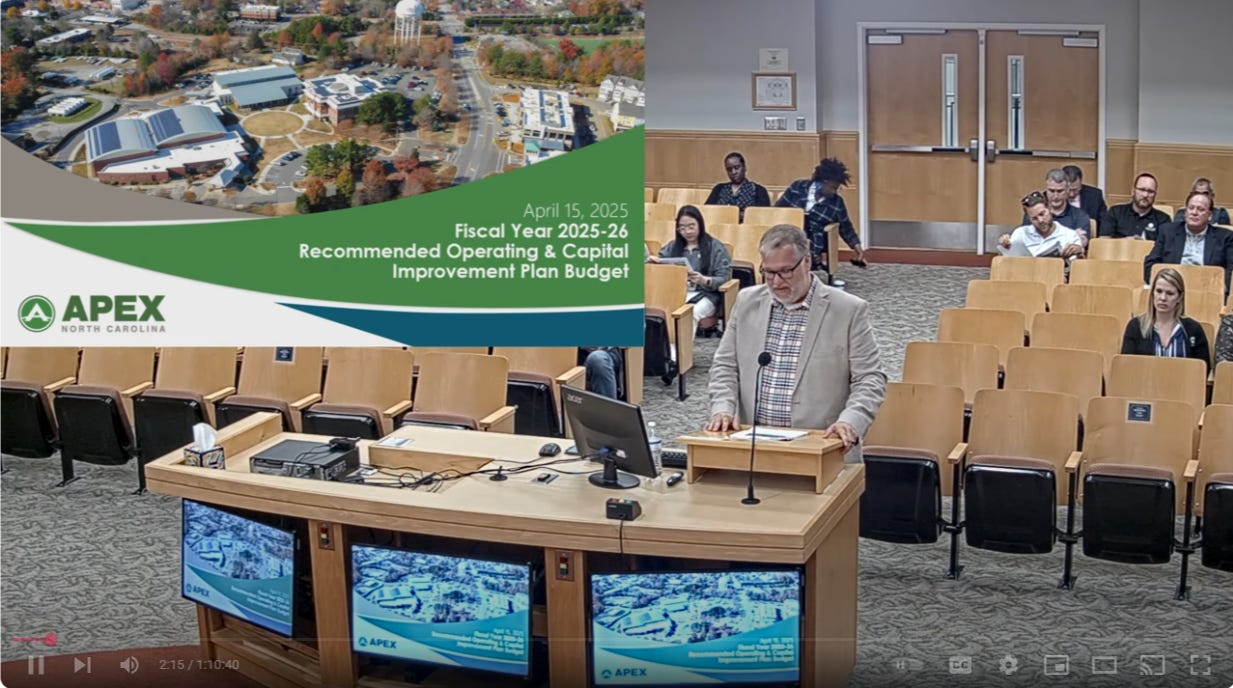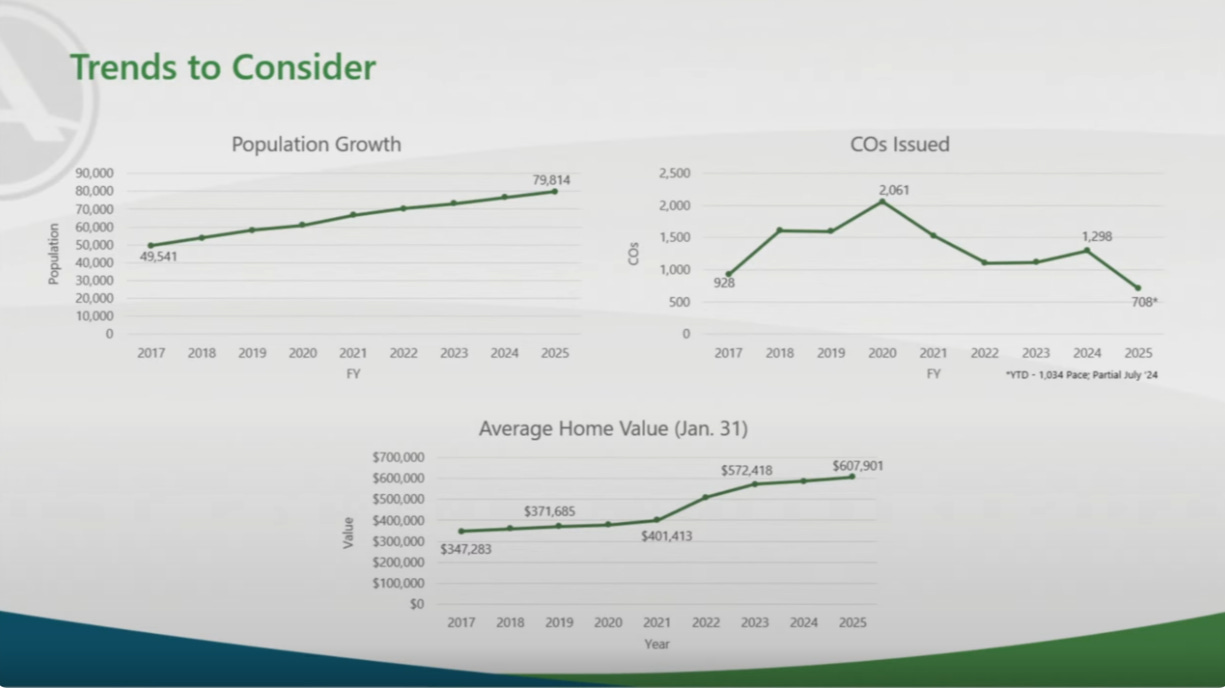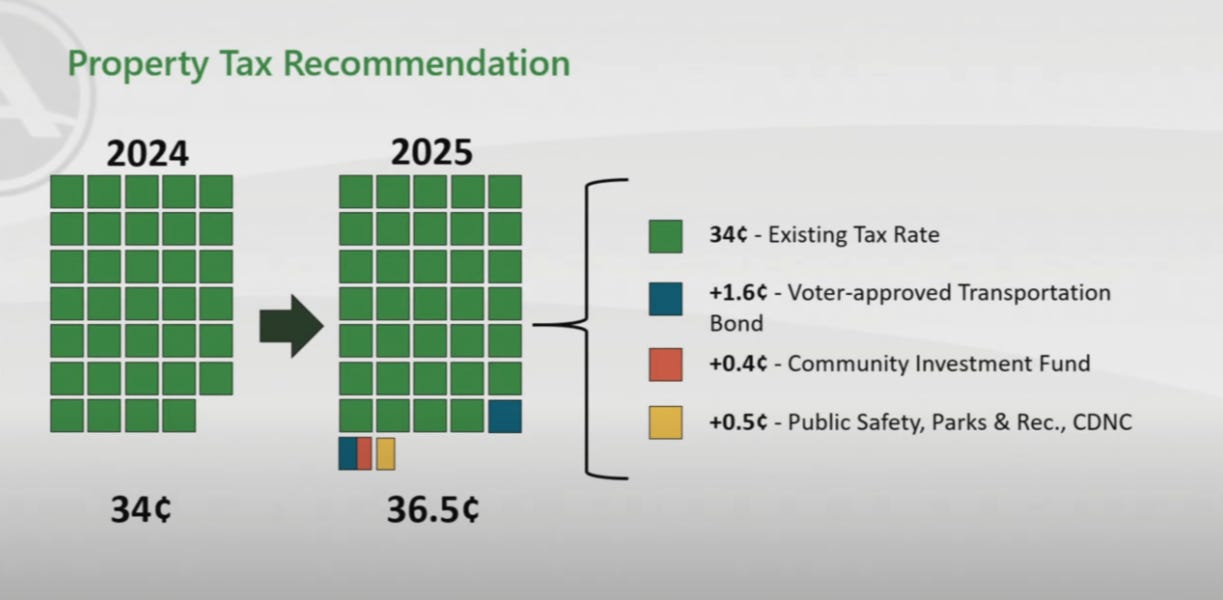Apex Budget Projects Average per Household Monthly Cost Increase of $22.74 for Upcoming Year
Town Manager’s budget details rate hikes, capital investments, and cost pressures. The proposed property tax increase would still keep Apex’s rate below its 10-year average of $0.40.
Apex, NC, Apr. 21, 2025 — Apex residents could see their average monthly household costs rise by $22.74 under the proposed Fiscal Year 2025–2026 town budget, according to a presentation delivered by Town Manager Randy Vosburg at the April 15 Town Council work session. The proposal outlines a range of rate and tax increases, alongside strategic investments in infrastructure and staffing.
Residents will see increases in nearly all categories of municipal services:
Property Tax: from $0.34 to $0.3615 per $100 valuation
Electricity: $1.50 base fee increase, 4% energy rate increase
Water and Sewer: ~4% increase in base and volume rates
Solid Waste: $0.35 monthly increase
Stormwater: no change
The proposed property tax increase would still keep Apex’s rate below its 10-year average of $0.40. Increases in utility rates were also framed as necessary to address rising operating and infrastructure costs, with average usage metrics used to estimate monthly household impacts across water, sewer, and electricity services.
Capital Pressures and Cost Inflation Shape Budget Choices
The budget process began with significant fiscal headwinds. Initial department requests exceeded projected revenues by as much as $16 million, necessitating difficult decisions by staff to balance the budget. The Town ultimately reduced its capital investment requests by $5.4 million, trimmed $3.1 million from operating expenses, and approved only a portion of the requested personnel additions.
These reductions came amid escalating costs across nearly every category of infrastructure and operations. The town is facing steep inflation in materials and equipment, with prices for items such as LED lighting, piping, and construction materials increasing by 35% to 65%. The town also experienced higher-than-expected bids on capital projects, including a 33% overage for the Tunstall House and a 40% overage on the Jones Street improvement project.
Delays and long lead times have further complicated the planning process. It now takes over two years to receive fire engines or transformers, and about five months for electric meters. Vosburg emphasized the challenge of planning in this environment, stating, “Think of the uncertainty within six months right now on some of those commodities that we’re purchasing.”
As a result, the town has scaled back or deferred some projects while strategically prioritizing capital investments essential to maintaining utility service, ensuring safety, and complying with environmental standards.
Investing in People and Services
Despite budget constraints, the proposed plan includes targeted staffing and compensation investments designed to support service delivery and address workforce needs. Apex is proposing 32 new full-time positions across the general fund, electric fund, and water and sewer operations. These include roles in public safety, engineering, planning, and cybersecurity, all fields aligned with strategic growth and risk management.
The town is also adjusting employee compensation to remain competitive with neighboring municipalities. The proposed budget includes a 2% across-the-board market adjustment and a 3% average merit increase, down from the 4% merit average in the previous year. These decisions, Vosburg explained, reflect a more conservative approach in light of regional economic indicators and the need to maintain financial balance.
Health insurance costs have increased by 16.6%, while retirement contributions rose by 1%, both of which were absorbed in the budget. Dental coverage saw a more modest 5.2% increase.
Vosburg noted the importance of supporting the town’s workforce, saying, “If we can do a good job on that third piece, then we’re going to maintain public trust and we’re going to take good care of our residents.”
Growth, Demand, and Strategic Guidance
Apex continues to experience rapid residential growth, with projections indicating that over 1,000 new Certificates of Occupancy (CO) will be issued this year. Though below the 2020 peak of roughly 2,000 COs, the pace remains well above historic norms. The town's population now stands at around 80,000, although Vosburg acknowledged that internal projections are already higher.
This high demand for housing and services reflects the community's appeal, but it also introduces pressure on infrastructure, staffing, and resource allocation.
“We hear a lot about traffic, home prices, school capacity, all valid concerns that we need to hear about,” said Vosburg. “But if you think about why we’re hearing about those things, it’s because people want to be here.”
To guide decision-making, the town relied on two primary strategic tools: the third-year implementation of Game Plan Apex, its long-range strategic plan, and the results of the latest budget priority survey. The survey confirmed that residents’ top concerns include responsible development, transportation infrastructure, public spaces, and strong customer service. The data also highlighted continued interest in environmental stewardship and economic development.
Internal planning was further shaped by ongoing input from elected officials during council retreats, workshops, and strategic updates. Vosburg reminded attendees, “We’ve had several opportunities and meetings with you… We’ve had council retreat… strategic plan update meetings… and received input in different fashions from each one of you.”
Council Priorities and Budget Transparency
The property tax increase included in the proposed budget is broken down into discrete components to reflect transparency and alignment with council direction. Of the total 2.15-cent increase, 1.6 cents is tied to previously approved transportation bonds and a new community investment fund dedicated to capital projects. The remaining 0.5 cents is allocated to fund new staff positions in departments that reflect council priorities, particularly in public safety, planning, and parks.
Vosburg explained that the increase is not arbitrary, saying, “There’s complete transparency. There’s no magic behind what the increase is led by.” The tax rate—while rising to $0.3615—remains below the town’s 10-year average of $0.40, and is still among the lowest in recent memory.
The structure of the budget presentation also left room for council input. Each department was asked to highlight both funded priorities and unfunded needs, giving elected officials flexibility to make late-stage adjustments if desired. As Vosburg noted, the intent was to “leave you with an opportunity if you’re like, oh, I think I want to give something back to the budget, put something in.”
Ultimately, the budget seeks to reflect not only the financial realities of a growing town but also the policy directions voiced by Apex’s elected leadership.
For more information or to share your thoughts, contact the Mayor or Town Manager:
Mayor Jacques Gilbert
Email: jacques.gilbert@apexnc.org
Town Manager Randy Vosburg
Email: randy.vosburg@apexnc.org



